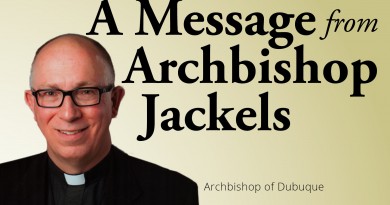Both/and, not either/or: A Catholic ‘seamless garment’ approach on right to life issues
Both/and, not either/or.
The bishops of the USA, at their June meeting, made some strong statements about the present administration’s inhumane treatment of immigrants, especially the practice of separating children from their families.
And our Holy Father Pope Francis, at a gathering of families in Italy this June, spoke forcefully from the heart against abortion, even equating it to the Nazi policy of exterminating people they considered undesirable.
The Pope has of course been very vocal about immigration issues, just as the US bishops have spoken out against abortion. That’s because for Catholics these are both/and issues, not either/or.
The right to life and the right to have access to those things needed to live in dignity are foundational rights in Catholic social teaching.
Things like food and shelter, productive work and fair wages, education and health care, and protection from harm, are fought for and defended as human rights because they constitute a dignified human life. But first the right to life has to be defended, otherwise those other rights make no sense, have no context.
This is the inspiration for speaking about the defense of unborn life and of the hungry and homeless as a seamless garment; both/and, not either/or.
In this regard, reflect on the teaching of Pope Francis, in his Apostolic Exhortation on the call to holiness in today’s world, reminding Catholics that we cannot conceive of holiness apart from social engagement, and that we can’t justify a social engagement that focuses only on one ethical issue to the exclusion of others:
“Our defense of the innocent unborn needs to be clear, firm and passionate, for at stake is the dignity of human life, which is always sacred and demands love for each person, regardless of his or her stage of development. Equally sacred, however, are the lives of the poor, those already born, the destitute, the abandoned and the underprivileged, the vulnerable infirm and elderly exposed to covert euthanasia, the victims of human trafficking, new forms of slavery, and every form of rejection” (101).
Catholics are both/and people, not either/or.


